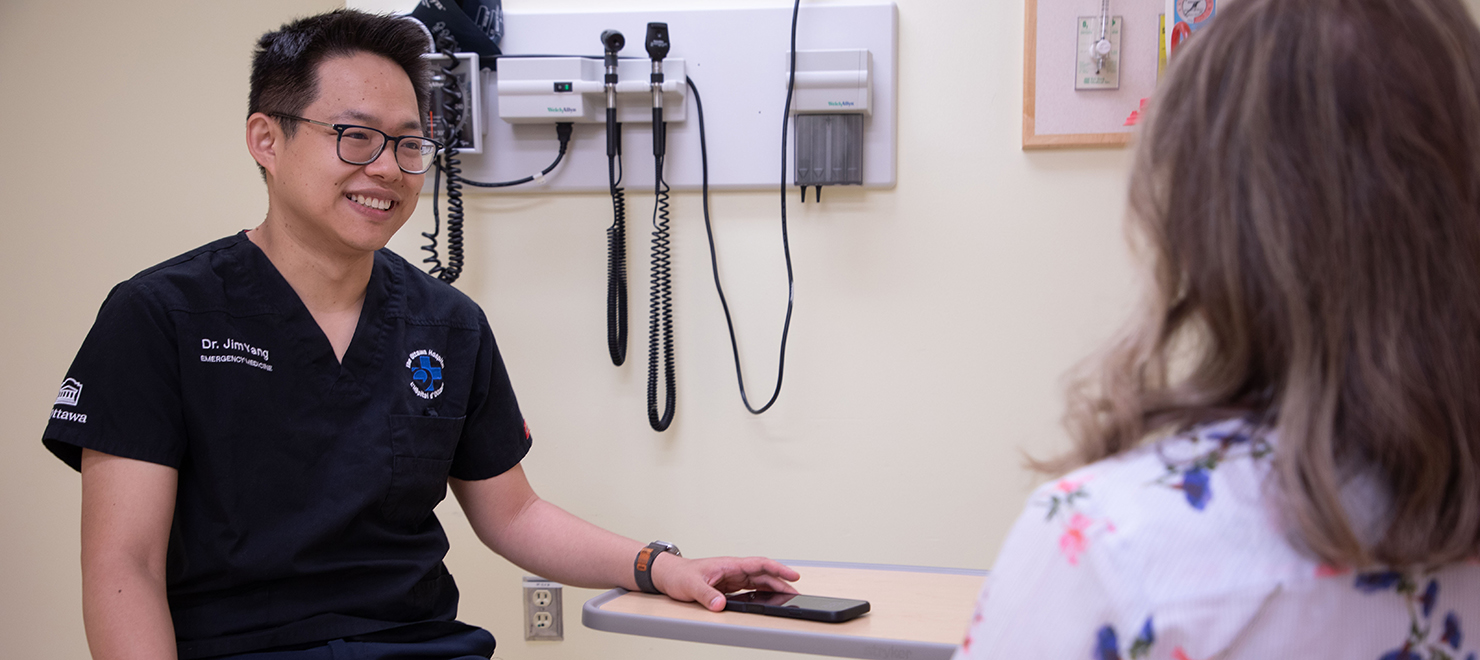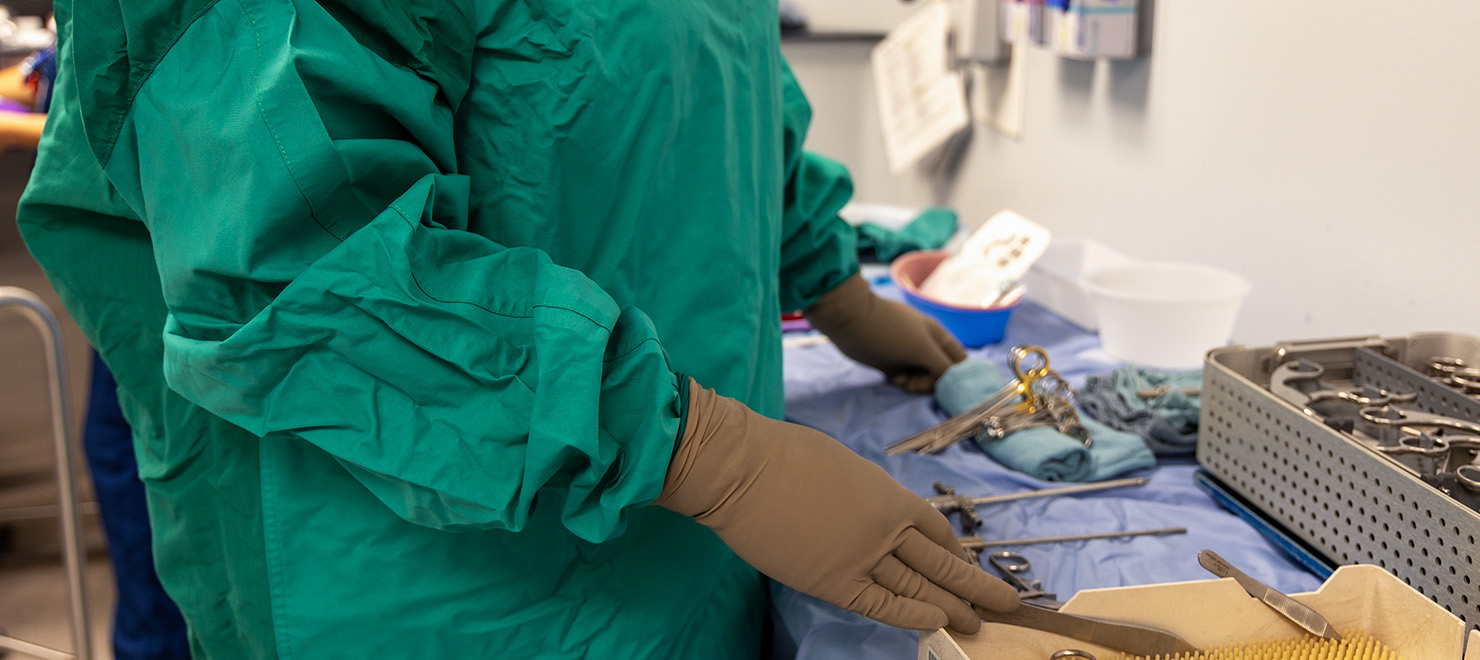
Growing up in the ‘70s and ‘80s, Spencer Hayward never met anyone who felt the same way he did.
Today, Spencer, a trans man, is a mentor to others who are socially or medically transitioning to the gender that aligns with their gender identity. “I consider myself an elder, so I help the younger crowd with their questions,” he says. “I want to help other people get to their end goal.”
He wants to help because he knows that this journey isn’t straightforward, especially for patients with complex medical needs. Just two years ago, his own journey looked uncertain. Thankfully, he managed to find the care he needed from a specialty clinic at The Ottawa Hospital.
A roadblock on his journey
In 2021, Spencer was told he had an aggressive form of breast cancer. After surgery and completing his course of treatment, he was deemed cancer free.
But there was one problem.
As part of his gender-affirming care, Spencer was on testosterone therapy, which doctors said could lead to a recurrence of his cancer. “They said I might have to stop testosterone entirely,” he recalls. “That’s when Dr. Druce came into the picture.”
Caring for patients who may have nowhere else to go
Dr. Irena Druce is an endocrinologist at The Ottawa Hospital. Endocrinologists are experts in hormones and the glands that produce them. Transgender patients may see an endocrinologist for hormone therapy as part of their gender transition.
Dr. Druce worked with Spencer to find a way for him to continue his gender-affirming hormone therapy while also mitigating the risks of his cancer returning.
Spencer was one of the first patients at The Ottawa Hospital’s Gender Diversity Specialty Clinic, launched in January 2022 by Dr. Druce and fellow endocrinologist Dr. Heidi Dutton, with the support of Dr. Heather Lochnan, Head of the Division of Endocrinology and Metabolism. The clinic helps trans and non-binary patients like Spencer who have had or are currently living with medically complex conditions.
“A lot of primary care providers are not comfortable with transgender health and may deem medically complex patients too high a risk to transition. These patients really have nowhere else to go for advice,” explains Dr. Druce. “And it’s well established that providing this therapy decreases the mental health burden, including suicidality rates.”
The Ottawa Hospital’s Gender Diversity Specialty Clinic is one of Canada’s only hospital-based clinics dedicated to caring for medically complex trans and non-binary patients.
Treating patients as partners
Medically complex patients may require the assistance of an endocrinologist to help determine which path their hormone therapy should take.
These include patients who have had a hormone-dependent cancer (such as breast or prostate cancer) or an embolic disease (such as a stroke, heart attack or pulmonary embolism) or who are taking immunosuppressants or HIV treatment.
Our clinic finds a hormonal regiment tailored to each patient and refers them to their primary care provider, who can perform the therapy and follow up with them throughout their gender affirmation journey. For patients who do not have a primary care provider, our clinic will refer them to a trans health program in the community, like the one at the Centretown Community Health Centre.
“I call myself a ‘steward of hormones,’” says Dr. Druce. “I work with each patient to establish their individual goals. I want to hear what they would like, and then I will let them know whether we can achieve that.”
Dr. Druce’s empathy has meant a lot to Spencer. “Every time I see her, it’s like sitting down having coffee with an old friend,” he says with growing emotion. “She just exudes this positivity. I was going through a really crappy time, and she was like, ‘Let’s figure this out together.’ She really cares about the people in her care. That’s what everybody hopes for with a doctor, but you don’t always get it.”
Helping both patients and health-care providers
Dr. Druce wants to connect more patients like Spencer to the kind of doctors that they’ve long hoped for. That’s why the Gender Diversity Specialty Clinic also serves as a training centre for our endocrinologists.
“Research has demonstrated that one of the main reasons why health-care providers are not providing transgender medicine is that they don’t feel comfortable because of a lack of training,” explains Dr. Druce. “The main reason I helped establish this clinic was to provide a space for our endocrine trainees to get more exposure to this field of medicine so that when they graduate, they feel comfortable seeing this patient population. We need more health-care providers to do this work.”
Training more health-care providers is critical to fulfilling a growing demand for gender-affirming therapy and cutting down on growing wait times.
“Members of the trans and non-binary community are becoming more visible these days, which is fantastic. There’s now so much openness that patients feel empowered to finally live freely. This has increased the need to provide gender-affirming therapy,” explains Dr. Druce.
Hoping to inspire other clinics
The Ottawa Hospital’s Gender Diversity Specialty Clinic is open on the third Friday of every month, but Dr. Druce hopes to grow the clinic and inspire other health-care providers to open clinics of their own.
“Our clinic is still slowly taking off, but even the fact that it exists is really important,” she says. “The hope is that eventually we’ll be able to show how successful we’ve been and inspire other health-care providers to take our lead.”
For Spencer, the clinic is already a success story. “Everybody there that I’ve ever dealt with has been absolutely stellar as far as their care and their attitude,” he says. “These people have been very empathetic, and they’ve seen things from my point of view. I’m in awe of our hospital. For anybody who’s transitioning or questioning their gender, I would definitely recommend this clinic to them.”
Helpful resources for the 2SLGBTQ+ community and allies
The Ottawa Hospital is committed to providing compassionate, relevant care to the 2SLGBTQ+ community. 2SLGBTQ+ is an initialism that stands for two-spirited, lesbian, gay, bisexual, transgender and queer, with the plus representing other sexual identities. Here are a few ways we’re addressing the unique care needs of this often overlooked population:
- New Research Chair in Gay Men’s Health is setting out to break down barriers to care: Physician-scientist Dr. Paul MacPherson shares his plans to make quality health care more accessible to gay men.
- How patients and family members are helping to infuse pride into The Ottawa Hospital’s DNA: Learn about four initiatives spearheaded by our Rainbow Patient and Family Advisory Committee (PFAC) that are helping to create safer spaces for the 2SLGBTQ+ community.
- The Trans Health Program at the Centretown Community Health Centre: Our clinic refers many patients to this program, which offers surgery referrals, adult counselling, hormone starts and more.

Support patient care and research at
The Ottawa Hospital
You might also like…
Less time charting means more time with patients: How The Ottawa Hospital is using AI to support patient care
“I’m seeing and treating more patients.” Find out how DAX Copilot, a powerful AI assistant, is helping our physicians cut down on paperwork, improve their own well-being and spend more time with patients.
Aging well: Guidance for older adults
In this special video series for both older adults and their loved ones, geriatric care specialists from The Ottawa Hospital offer guidance on navigating common health-care challenges that may arise with aging.
How to stay safe around water this summer
Drowning can happen to anyone — even strong swimmers. Emergency physician Dr. Christian Vaillancourt debunks common myths about drowning, explains how to act quickly to save a life, and shares what you can do to keep yourself and your loved ones safe around water.
What’s the difference between an optician, optometrist, orthoptist and ophthalmologist?
“Do I need to see an optician, optometrist, orthoptist or ophthalmologist?” We asked Ophthalmologist Dr. Annick Fournier to break down each role so you will know who to consult for your specific eye care needs.
New reusable surgical gowns a step towards greener operating rooms
The Ottawa Hospital is finding safe, innovative ways to reduce medical waste in its operating rooms by using more environmentally sustainable products.
Understanding rabies: Risks, vaccination and what to do after a bite
Although rare in Canada, rabies is almost always fatal once symptoms appear. Infectious diseases expert Dr. Michaeline McGuinty shares how rabies is spread, when to get vaccinated and what to do after a bite.


 To reset, hold the Ctrl key, then press 0.
To reset, hold the Ctrl key, then press 0.





